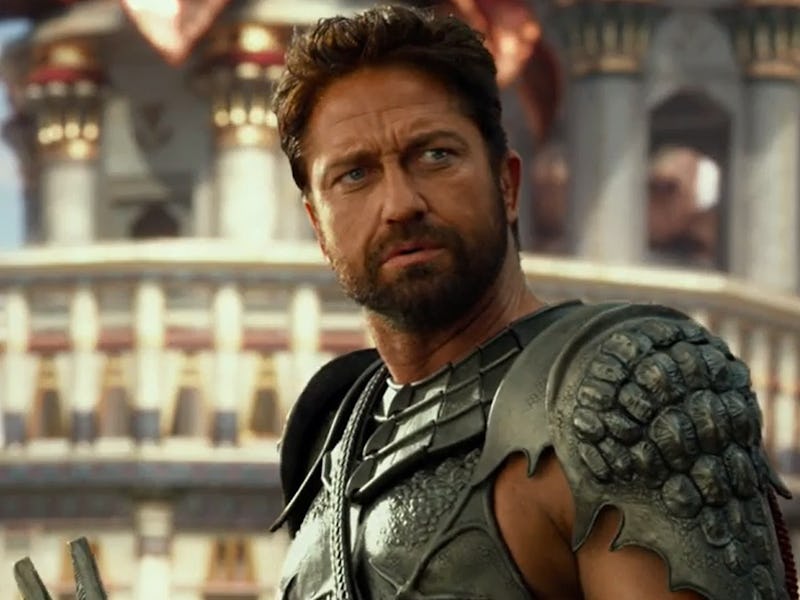Lionsgate's Apology for All-White 'Gods of Egypt' Is Fascinating Nonsense
Hollywood is learning they will have to start taking calls for diversity seriously or risk economic consequences.

Once again, the internet is abuzz on the issue of diversity, or the lack thereof, in Hollywood. This time the focus is Lionsgate’s new Alex Proyas directed blockbuster Gods of Egypt about a caucasian mortal embroiled in a battle between the ancient caucasian Egyptian deities Horus and Set. Protagonist Bek, played by Australian actor Brenton Thwaites, looks an update on Ryan Gosling’s Young Hercules, while Horus (Nikolaj Coster-Waldau) and Set (Gerard Butler) look like straight-to-Netflix versions of Thor and Loki. If not for the exploding pyramids and the helpful hint in the title, there would no indication in the trailer that the movie isn’t a Stargate update.
Protagonist Bek, played by Australian actor Brenton Thwaites, looks like an update on Ryan Gosling’s Young Hercules, while Horus (Nikolaj Coster-Waldau) and Set (Gerard Butler) look like straight-to-Netflix versions of Thor and Loki. If not for the exploding pyramids and the word Egypt in the title, there is pretty much no indication this movie takes place in Northern Africa.
As soon as said trailer was released, the internet immediately called bullshit, a response so swift and strong it actually prompted an express joint apology from Lionsgate and Proyas:
The process of casting a movie has many complicated variables, but it is clear that our casting choices should have been more diverse. I sincerely apologize to those who are offended by the decisions we made.
That’s a nice sentiment, but it’s worth noting that this isn’t a movie about comic book heroes or secret agents where race “shouldn’t matter” (not that whitewashing is realistic generally). There is actual documented proof in museums across the planet that pre-Ptolemy Egyptians weren’t exactly flaxen-haired Europeans. The thing is, whitewashing on such a grand scale is more than accident or happenstance. It actually takes a conscious choice, and a lot of damn work to be this historically inaccurate.
A Ramses the Great statue from Ridley Scott's *Exodus* vs. a an Ramses the Great statue
The “complicated variables” of casting a movie Proyas mentioned? He really means the notion that people won’t go see movies starring black and brown people even if the movies happen to be about actual black and brown people. Hacked emails from Sony executives warn that even accomplished Black actors like Denzel Washington don’t “play well” overseas. Ridley Scott admitted that when making movies like Exodus: Gods and Kings, he didn’t even think of a minority cast because it wouldn’t get funded:
I can’t mount a film of this budget, where I have to rely on tax rebates in Spain, and say that my lead actor is Mohammad so-and-so from such-and-such. I’m just not going to get it financed. So the question doesn’t even come up.
The rush to issue the apology, as halfhearted as it may be, at least shows that Hollywood is beginning to take its diversity problem seriously. Producers have not suddenly had a come-to-white-Jesus moment when it comes to diversity out of any sort of moral concern. Rather, they are starting to see that lack of diversity, especially when it is so blatantly ahistorical, is a finally a reason why people are refusing to pay for their product.
Perhaps the silver lining in all this is that viewers are demanding more diversity and inclusion in their viewing choices. Diversity in films has always been a problem, but with the amplification of social media, as well as the advocacy of influential minority actors, directors, and producers like Shonda Rhimes, Ava DuVernay, Viola Davis, and recently Aziz Ansari, inclusion has become a legitimate buying decision.
Scott’s Exodus, which notably featured a similarly all-white cast, featuring Christian Bale as Moses, ended up being a colossal flop. Yes, part of that was the fact it opened around the same time as the second Hunger Games. And yes, a lot of it had to do with the fact that it was bad. But don’t think for a moment the objections to the casting didn’t have a negative impact on box-office receipts.
Gods of Egypt had just about finished shooting when Scott’s Exodus lit a fire on social media and imploded. The almost instantaneous mea culpa over the casting is a sign Lionsgate and Proyas knew the blowback was coming; it’s a safe bet to say that someone had drafts of this apology pre-loaded, ready to publish. Should the swift apology be enough to appease critics? Probably not, but the receipt might be.
Still, if the film does well internationally, it might mean the wrong sort of paradigm shift: Hollywood learning how to better speak the language of doing better without actually doing better. However, if Gods of Egypt ends up being another $200,000,000 mistake, there’s a chance the lip service stops and real change begins to happen.